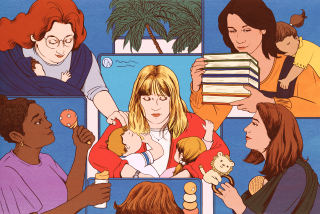HEALTH : Times Change and So Has the Image of Wet-Nursing
- Share via
The baby fusses. He’s hungry. So Jayne Waldon, a Glendale mother of three, does what any nursing mother would--she scoops up Dennis, undoes her blouse and begins to breast-feed.
Another touching maternal scene? Well, kind of. Waldon isn’t Dennis’ mother; Ava Bise of Los Feliz is. The two women are close friends and Waldon is baby-sitting.
Bise and Waldon are two of four mothers in a Silver Lake baby-sitting cooperative who have revived the historic tradition of wet-nursing and are breast-feeding each other’s babies.
The wet-nursing occurs without fanfare when the mothers watch each other’s children to permit an occasional evening out or a day trip to run errands. Within the admittedly limited scope of the Silver Lake co-op, the experience for mothers and babies has been a healthy one, the women say.
“It seemed like the right thing to do to make the baby more comfortable,” says Waldon, whose youngest son, Zachary, is 2. “You have an abundance of milk anyway so why not offer it?”
No Statistics Available
Few doctors have studied modern-day wet-nursing and there are no statistics on how many women nurse each other’s babies. Nonetheless, some pediatricians say the 4,000-year-old practice isn’t rare, merely undocumented. And while they hardly expect wet-nursing to catch on like disposable diapers, they do note its slow, steady rise.
“Cross nursing . . . appears to be an increasingly popular, if not well-reported practice,” Judith Z. Krantz and Nancy S. Kupper wrote in a 1981 University of Louisville School of Medicine report.
The study, one of the few on contemporary wet-nursing, concluded that the practice appeared to have no ill effects and might provide an attractive alternative for working mothers.
But the practice has its critics. La Leche League International, an organization of nursing mothers that strongly advocates breast-feeding, discourages wet-nursing, saying it might interfere with mother-child bonding and spread diseases such as the AIDS virus.
Some medical professionals agree there are potential risks to nursing another’s child. “If someone were critically ill with some infectious disease where bacteria were going through the blood, it could cause a problem,” says Richard Narkewitz, president of the American Academy of Pediatrics.
The AIDS virus has been found in breast milk, he adds, although there are no known cases of transmission through breast-feeding. The University of Louisville report recommended that cross-nursing mothers be screened for syphilis, hepatitis and other potentially infectious agents.
The Silver Lake nursing mothers are satisfied that they run few risks. They share strong beliefs about nutrition, health and child-rearing and feel comfortable allowing co-op colleagues to nurse their children because of the general camaraderie in which the group thrives.
“It requires a level of trust but any baby-sitting set-up requires that,” says Bise, who has breast-fed three other co-op babies.
Equally important, the women say, are the strong emotional bonds that develop between the mothers and the infants they nurture so intimately.
Bonding Takes Place
“They become my baby if they’re in my arms,” says Bise, whose youngest son, Dennis, is 21 months old. “The bonding that takes place when you nurse someone else’s kids seems to linger.”
Others agree.
“It’s not like some brand-new hippie thing that’s never been done before,” says Ellen Becker, an editor at Mothering magazine, an alternative child-rearing publication based in Santa Fe, N.M.
One who is intrigued by the idea is pediatrician and best-selling author Dr. Benjamin Spock, who lives in the Virgin Islands.
“I think it’s great they’ve thought up something that works for them,” Spock says, when told about the Silver Lake breast-feeding cooperative. While he isn’t familiar with any contemporary wet-nursing arrangements, Spock praises the idea as practical. “I don’t see why it wouldn’t be a good thing to do,” he says.
Certainly, wet-nursing has a historic precedent. The practice was common in Ancient Greece and Rome and thrived during the Renaissance. But unlike those early wet nurses--who were often poor, unschooled and malnourished--the Silver Lake-area co-op members are mostly educated, middle-class professionals who work as writers, lawyers and social workers.
Moreover, they say that wet-nursing allows for time off without having to rely on formula or rush back for feedings.
“My baby doesn’t take a bottle. I’m very glad there are moms I can leave him with,” says Marion Dies, a breast-feeding mother whose son, Stevie, is 11 months old.
Mothers say the experience can also be warming.
“You feel very close to the babies you breast-feed. It’s a support system that’s invaluable to me,” says Waldon, a single mother who likens the co-op to an “extended family, something you don’t often have in an urban environment.”
Babies Are Willing
The women report that their babies usually nurse willingly from other women, go to sleep readily and don’t suffer separation anxiety when they leave.
Wet-nursing can also relieve anxiety in mothers, although it sometimes strikes curious emotional chords. Says Bise: “It was so odd the first time I saw someone nursing my child. It was almost like catching a glimpse of myself.”
Additionally, the women say, wet-nursing is less cumbersome than expressing milk, the process by which nursing mothers extract milk from their breasts by hand or with breast pumps to feed their infants at a future time.
The co-op is so popular, says president Janis Cohen-Milch--who cross-nursed when her daughter Tara was born two years ago--that there are four families on the waiting list to join. Membership is limited to 35 families so the co-op doesn’t grow too large or unwieldy.
One member, David P. Sentance, recalls that when his wife died in early 1987, leaving him to raise his 5-month-old son Jeremy, one nursing mother offered to breast-feed the infant.
While Sentance opted for formula instead, he says the co-op provided “a very important link for me. I’d call them up and say, ‘What would you do?’ ”
Dr. Paul Fleiss, a Los Feliz pediatrician who lectures on infant feeding at UCLA’s School of Public Health, is convinced that the Silver Lake co-op mothers aren’t alone; they are merely more high-profile than other wet-nursing moms.
“Mothers have been doing this for a long, long time. It’s not quite as good as the baby’s mother but it’s better than propping the baby up with a bottle,” Fleiss says.
Witness Stephanie Larro of Van Nuys, who has no connection with the Silver Lake co-op. Larro cross-nursed with a close friend in the San Fernando Valley four years ago when their children were born.
“We felt connected with each other and it was comfortable for us to attempt. I did it because he was at my house and he was very little and I was also nursing my own son,” Larro said of her friend’s child.
Dies, a nursing mother from Silver Lake, said she brought up the idea gingerly at first because she was unsure of how other mothers would react.
“It takes a certain kind of relaxed attitude. Some people are kind of up-tight about breast-feeding anyway,” she says.
Breast-feeding in general has rebounded in the last 25 years as women’s beliefs about childbirth and child-rearing have changed. Before World War I, most women breast-fed, but as formula came into increased use via advertising and marketing campaigns, the number of nursing mothers declined.
In 1970, breast-feeding stood at 25%, according to Ross Laboratories, a Columbus, Ohio, manufacturer of prepared formula that has charted baby nutrition patterns for 30 years. Today it stands nationally at about 56%.
Most pediatricians agree that breast milk is significantly better as a nutrition source than formula or cow’s milk.
But for the Silver Lake mothers and others in Los Angeles who have cross-nursed, the impetus seems to come more from instinct than statistics.
“It’s touching to nurse another child,” Dies says. There comes a time when the baby “is tired and hungry and nothing else is going to comfort him. You know if you nurse, him he’ll be fine.”






